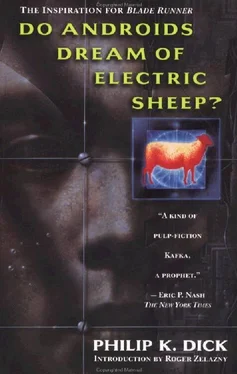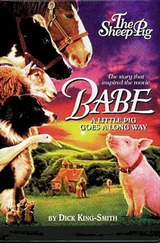“You got it to its feet,” Barbour said, remembering and nodding. “Yeah, you managed to lift it up but then after a minute or two of walking around it fell over again.”
Rick said, “Sheep get strange diseases. Or put another way, sheep get a lot of diseases but the symptoms are always the same; the sheep can’t get up and there’s no way to tell how serious it is, whether it’s a sprained leg or the animal’s dying of tetanus. That’s what mine died of; tetanus.”
“Up here?” Barbour said. “On the roof?”
“The hay,” Rick explained. “That one time I didn’t get all the wire off the bale; I left a piece and Groucho—that’s what I called him, then—got a scratch and in that way contracted tetanus. I took him to the vet’s and he died, and I thought about it, and finally I called one of those shops that manufacture artificial animals and I showed them a photograph of Groucho. They made this.” He indicated the reclining ersatz animal, which continued to ruminate attentively, still watching alertly for any indication of oats. “It’s a premium job. And I’ve put as much time and attention into caring for it as I did when it was real. But—” He shrugged.
“It’s not the same,” Barbour finished.
“But almost. You feel the same doing it; you have to keep your eye on it exactly as you did when it was really alive. Because they break down and then everyone in the building knows. I’ve had it at the repair shop six times, mostly little malfunctions, but if anyone saw them—for instance one time the voice tape broke or anyhow got fouled and it wouldn’t stop baaing—they’d recognize it as a mechanical breakdown.” He added, “The repair outfit’s truck is of course marked ‘animal hospital something.’ And the driver dresses like a vet, completely in white.” He glanced suddenly at his watch, remembering the time. “I have to get to work,” he said to Barbour. “I’ll see you this evening.”
As he started toward his car Barbour called after him hurriedly, “Um, I won’t say anything to anybody here in the building.”
Pausing, Rick started to say thanks. But then something of the despair that Iran had been talking about tapped him on the shoulder and he said, “I don’t know; maybe it doesn’t make any difference.”
“But they’ll look down on you. Not all of them, but some. You know how people are about not taking care of an animal; they consider it immoral and anti-empathic. I mean, technically it’s not a crime like it was right after W.W.T. but the feeling’s still there.”
“God,” Rick said futilely, and gestured empty-handed. “I want to have an animal; I keep trying to buy one. But on my salary, on what a city employee makes—” If, he thought, I could get lucky in my work again. As I did two years ago when I managed to bag four andys during one month. If I had known then, he thought, that Groucho was going to die … but that had been before the tetanus. Before the two-inch piece of broken, hypodermic-like baling wire.
“You could buy a cat,” Barbour offered. “Cats are cheap; look in your Sidney’s catalogue.”
Rick said quietly, “I don’t want a domestic pet. I want what I originally had, a large animal. A sheep or if I can get the money a cow or a steer or what you have; a horse.” The bounty from retiring five andys would do it, he realized. A thousand dollars apiece, over and above my salary. Then somewhere I could find, from someone, what I want. Even if the listing in Sidney’s Animal & Fowl is in italics. Five thousand dollars—but, he thought, the five andys first have to make their way to Earth from one of the colony planets; I can’t control that, I can’t make five of them come here, and even if I could there are other bounty hunters with other police agencies throughout the world. The andys would specifically have to take up residence in Northern California, and the senior bounty hunter in this area, Dave Holden, would have to die or retire.
“Buy a cricket,” Barbour suggested wittily. “Or a mouse. Hey, for twenty-five bucks you can buy a full-grown mouse.”
Rick said, “Your horse could die, like Groucho died, without warning. When you get home from work this evening you could find her laid out on her back, her feet in the air, like a bug. Like what you said, a cricket.” He strode off, car key in his hand.
“Sorry if I offended you,” Barbour said nervously.
In silence Rick Deckard plucked open the door of his hovercar. He had nothing further to say to his neighbor; his mind was on his work, on the day ahead.
In a giant, empty, decaying building which had once housed thousands, a single TV set hawked its wares to an uninhabited room.
This ownerless ruin had, before World War Terminus, been tended and maintained. Here had been the suburbs of San Francisco, a short ride by monorail rapid transit; the entire peninsula had chattered like a bird tree with life and opinions and complaints, and now the watchful owners had either died or migrated to a colony world. Mostly the former; it had been a costly war despite the valiant predictions of the Pentagon and its smug scientific vassel, the Rand Corporation—which had, in fact, existed not far from this spot. Like the apartment owners, the corporation had departed, evidently for good. No one missed it.
In addition, no one today remembered why the war had come about or who, if anyone, had won. The dust which had contaminated most of the planet’s surface had originated in no country and no one, even the wartime enemy, had planned on it. First, strangely, the owls had died. At the time it had seemed almost funny, the fat, fluffy white birds lying here and there, in yards and on streets; coming out no earlier than twilight as they had while alive the owls escaped notice. Medieval plagues had manifested themselves in a similar way, in the form of many dead rats. This plague, however, had descended from above.
After the owls, of course, the other birds followed, but by then the mystery had been grasped and understood. A meager colonization program had been underway before the war but now that the sun had ceased to shine on Earth the colonization entered an entirely new phase. In connection with this a weapon of war, the Synthetic Freedom Fighter, had been modified; able to function on an alien world the humanoid robot—strictly speaking, the organic android—had become the mobile donkey engine of the colonization program. Under U.N. law each emigrant automatically received possession of an android subtype of his choice, and, by 1990, the variety of subtypes passed all understanding, in the manner of American automobiles of the ig6os.
That had been the ultimate incentive of emigration: the android servant as carrot, the radioactive fallout as stick. The U.N. had made it easy to emigrate, difficult if not impossible to stay. Loitering on Earth potentially meant finding oneself abruptly classed as biologically unacceptable, a menace to the pristine heredity of the race. Once pegged as special, a citizen, even if accepting sterilization, dropped out of history. He ceased, in effect, to be part of mankind. And yet persons here and there declined to migrate; that, even to those involved, constituted a perplexing irrationality. Logically, every regular should have emigrated already. Perhaps, deformed as it was, Earth remained familiar, to be clung to. Or possibly the non-emigrant imagined that the tent of dust would deplete itself finally. In any case thousands of individuals remained, most of them constellated in urban areas where they could physically see one another, take heart at their mutual presence. Those appeared to be the relatively sane ones. And, in dubious addition to them, occasional peculiar entities remained in the virtually abandoned suburbs.
Читать дальше








